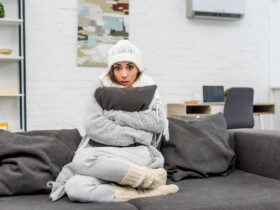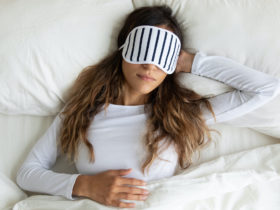Have you hit the night sweats phase of your menopause journey? Waking up in the middle of the night on a sweat-soaked pillow, peeling wet pajamas away from your body, and tangled in a drenched sheet is an all-too-common occurrence for women in their 40s and 50s.
Night sweats are synonymous with menopause, but how much do you really know about this menopause symptom?
Here’s what nobody tells you about night sweats.
Table of Contents
- What Are Night Sweats?
- What Causes Night Sweats?
- How Long Do Night Sweats Last?
- How to Prevent Night Sweats
- How to Help Night Sweats
- Should You See a Doctor For Night Sweats?
What Are Night Sweats?
Sweating is your body’s way of cooling and lowering your body temperature.
When your body temperature rises at night while you’re sleeping, your internal air-conditioning system will switch on to keep you cool. Your sweat glands activate and produce sweat, a mixture of water and salt. As sweat evaporates off your skin, it absorbs and carries heat away from your body.
You wake up in a tangle of sweat-soaked clothing and bedding, flipping your sopping wet pillow over and thoroughly annoyed that you’ve experienced night sweats. But your body has done its job: it cooled itself from the hot flash you experienced while sleeping.
Why does your body care about its temperature at night?
Body temperature is key to your circadian rhythm—your natural sleep-wake cycle.
There is a small region in your brain that controls your inner clock. This region (known as the suprachiasmatic nuclei or SCN) is activated by light and synchronizes your body temperature based on your environmental light signals.
The sun comes up, daylight hits your eyelids, sends a signal to the SCN region of your brain, and your body temperature increases. Before you go to bed at night, the sun sets, light decreases, and your body temperature drops. (Or at least, this is how we’re designed to operate. Modern living and artificial lights, lights from phones and screens, and night shift can interfere with our natural sleep-wake-light-temperature process.)
Your core temperature, normally 98.6°F, drops a degree or two as the night progresses. Then it begins to rise again about an hour or two before you wake up in the morning.
A cool sleep environment helps you sleep better, which is why you get the best sleep ever in a hotel room after you drop the thermostat to “Arctic.”
Since your body wants to maintain this natural process of overnight cooling, any sudden increase in body heat will be met with your internal cooling mechanism:
Night sweats.

What Causes Night Sweats?
Night sweats are caused by an increase in your body temperature when you’re sleeping. Many things can trigger an increase in body temperature, ranging from menopausal hot flashes to fevers, illness, medications, stress, and more.
Menopause Night Sweats
Night sweats are a result of hot flashes that happen at night. Hot flashes and night sweats are the #1 most common symptoms of menopause (and perimenopause, the first stage of menopause). As many as 85% of women experience menopausal hot flashes and night sweats as a result of hormonal changes.
Specifically, decreasing amounts of estrogen are to blame for the sudden onset of profuse sweating and sensation of intense heat in your head, neck, and upper torso.
Did you know? Perimenopause is the first stage of menopause, and you may experience symptoms of perimenopause, including night sweats and hot flashes, up to ten years before you enter the menopause stage. Learn more about the three stages of menopause.
Fever Night Sweats
Night sweats from a fever can happen at any age. When you have a fever from an illness or your body temperature has increased as a result of a medication, your internal thermostat will attempt to regulate itself by activating your sweat glands in an attempt to cool down. Fever-related night sweats are also often accompanied by chills: involuntary shivering or shaking resulting from a rapid lowering of your body temperature below its set point (98.6°F).
Illness-Related Night Sweats
Fevers accompany a wide range of infectious and non-infectious diseases and heat-related illnesses, such as heat stroke. Many fevers are caused by an infection, and a fever could be a sign of bacterial infections, viruses, or parasites.
Fevers can also accompany non-infectious diseases, such as autoimmune disorders, certain cancers, cardiac disease, thyroid disease, and organ failure, to name a few.
Contact a medical professional immediately if you have a fever over 103°F or a fever accompanied by other symptoms.
Why does cancer cause night sweats?
Cancer can cause night sweats for many patients. Certain cancers, such as leukemia and lymphoma, can result in night sweats and excessive daytime sweating. Adrenal and carcinoid tumors are also associated with heavy sweating.
Hormone therapy treatment for breast, prostate, and gynecologic cancers can lead to night sweats, and many medications can lead to increased sweating, as well.
Medications that Cause Night Sweats
The medications that bring you relief can also bring you a bad case of night sweats. Certain classes of drugs, such as antidepressants, corticosteroids, ADHD stimulants, opioids, cancer treatments, diabetes medicines, and migraine medications, have all been associated with night sweats.
What medications cause night sweats?
Night sweats are a possible side effect of:
- SSRI antidepressants, such as Prozac and Lexapro
- Corticosteroids, such as Prednisone
- Stimulants for ADHD, such as Adderall
- Opioids, such as Oxycodone and morphine
- Breast cancer treatments, such as tamoxifen and anastrozole
- Diabetes medications, such as glyburide
- Migraine medications, such as sumatriptan
- NSAIDs (non-steroidal anti-inflammatory drugs)
Ask your medical professional if your medications could cause or worsen night sweats.
Anxiety and Stress-Related Night Sweats
Can anxiety cause night sweats? If you suffer from an anxiety disorder, you may experience night sweats. Anxiety disorder is a frequent, excessive, and intense worry and fear that can result in panic attacks. If you find yourself waking in the middle of the night, your mind racing and your body sweating, you may be experiencing anxiety-related night sweats.
Can stress cause night sweats? Chronic stress can affect serotonin and alter your body temperature, so yes, stress causes night sweats. In one study, researchers found that mice exposed to chronic stress (21 days of stress) had lower levels of serotonin and significantly higher core body temperatures compared to non-stressed mice.
If chronic stress is causing your body temperature to increase like the mice in the study, your internal thermostat may be turning on the night sweats in an attempt to get you cooled back down to a normal range.
Alcohol and Night Sweats
If you like to wind down with a glass of wine before bed, you may want to know that alcohol can cause night sweats. Drinking alcohol can cause your blood vessels to open wider than usual (vasodilation). This moves blood closer to your skin, which increases your body temperature and triggers night sweats.
Alcohol-related night sweats can happen whether you’ve been binge-drinking at your bestie’s bachelorette party or if you’ve slowly sipped a single glass of Sauvignon Blanc.
If you’re suffering from existing menopause night sweats, be aware that alcohol could aggravate an already aggravating situation.
Alcohol withdrawal or alcohol allergies can also be associated with night sweats. If you need help with an alcohol addiction, call 1-800-662-4357.
Night Sweats and Dehydration
When you sweat, your sweat glands produce water and salt. If you lose too much water and electrolytes (such as sodium, chloride, and potassium) from sweating, you could become dehydrated.
Can dehydration cause night sweats? While excessive night sweats could cause dehydration, it’s not likely that dehydration could cause night sweats. When you become dehydrated, your body loses its ability to cool you down naturally by sweating, and as your body temperature rises, it could cause heat stroke.
If you are experiencing night sweats, it’s important to stay hydrated so you can avoid dehydration. When you wake up in the morning, be sure to rehydrate after night sweats with a large glass of water. You may consider sipping on additional electrolytes during the day as well.
After all, if you’re going to sweat like an athlete training for the Olympics, you might as well rehydrate like one, too.
Sweat Disorders
There is one more possible cause of night sweats, and that is sweat disorders. Hyperhidrosis is excessive sweating not related to a hot environment, exercise, or feelings of stress or anxiety.
Primary hyperhidrosis is a result of faulty nerve signals that trigger overactive sweat glands, typically in the hands, feet, underarms, and face. It is typically hereditary and unrelated to any other medical issues. Secondary hyperhidrosis can cause sweating all over the body and is often related to an underlying cause, such as an illness, medication, or condition, including menopausal hot flashes.

How Long Do Night Sweats Last?
Night sweats can last for years. A long-term, nationwide study of women’s health found that menopausal women can experience hot flashes and night sweats for seven to 11 years.
The study defined hot flashes or night sweats as frequent if they occurred six days or more in a two-week period. Frequent night sweats and hot flashes were highly related to poor outcomes, including:
- Anxiety
- Depression
- Sleep disturbances
- Decreased health-related quality of life
- Cardiovascular risk
- Bone health (lower bone mineral density)
“The data from this study confirm what many women already know firsthand. Hot flashes can go on for years and take a toll on a woman’s health and well-being,” says Dr. JoAnn Manson, professor of women’s health at Harvard Medical School and professor of epidemiology at Harvard School of Public Health.
How To Prevent Night Sweats
Can you prevent night sweats? In some instances, maybe. If your night sweats result from a medication, you may be able to prevent them by speaking to your medical practitioner about alternative medicines that won’t cause night sweats.
Some infectious diseases that cause night sweats may be prevented. And you may be able to lower your risk of some non-infectious diseases with lifestyle changes.
But menopausal hot flashes and night sweats can happen to as many as 85% of women. For many of us, hot flashes and night sweats can not be prevented.
But they can be managed.
This post may contain affiliate links, which provide a small commission to us when you purchase, at no additional cost to you. Thank you for helping to support our efforts in providing you the best, most up-to-date information for GloWell.
How to Help Night Sweats
There’s a possibility that you may experience night sweats for seven to 11 years during the three phases of menopause. So, knowing how to help night sweats is essential.
Decrease Your Bedroom Temperature
Remember that your night sweats are caused by a hot flash while you sleep. Sleeping in a cool room is an easy way to help combat your rising internal body temperature.
You’re probably not sleeping at the optimal temperature anyway; the best temperature for sleep is between 60°F and 67°F, according to sleep psychologist Michelle Drerup, PsyD. It may be tempting to go lower, but anything lower than 60°F is too cold.
Take a Pre-Bed Bath or Shower
You can help trick your body into cooling down while you sleep by increasing your body temperature with a hot bath or shower before bed. Researchers have found that water-based passive body heating (aka a hot shower) effectively cools core body temperature and improves sleep quality. The hot water will increase your core temperature. Your body then attempts to cool down by directing heat out of your core and towards your hands and feet. (You can amplify the effects by putting warm socks on your feet.)
The trick to this is to take your hot bath or shower one-to-two hours before your normal bedtime. You don’t want to do it immediately before crawling into bed. So create a lovely bedtime wind-down routine complete with a warm bath or shower; even ten minutes of soaking can make this work.
Wear Breathable Sleepwear
Your body’s natural process for cooling down involves evaporation. As the sweat evaporates off your skin, it carries heat away with it. If your pajamas aren’t breathable, they could be trapping sweat and heat next to your skin and preventing your body temperature from cooling.
It’s time to upgrade your sleepwear. Choose from natural fibers such as organic cotton, linen, hemp, wool (yes, wool!), and bamboo in loosely woven fabrics for maximum breathability.
You may even want to experiment with synthetic athletic fabrics designed specifically to wick moisture and sweat away from the body.
But avoid sleepwear made from synthetic fabrics such as polyester, nylon, and acrylic that don’t breathe. These fabrics can hold on to moisture, trapping it (and some funky odors) next to your skin instead of wicking it or releasing it.
Upgrade Your Bedding
You spend nearly ⅓ of your life in bed sleeping. Or, in your menopause years, tossing, turning, and sweating in bed while attempting to sleep. Upgrading your mattress and bedding during these years is a perfect investment in your health and well-being.
Mattress and mattress toppers
If you have a memory foam mattress, it could be contributing to your hot flashes. Memory foam uses your body heat to conform around you, which gives it that signature supportive feel. But that same mechanism can also trap your body heat, giving it nowhere to go and no way for you to cool off. “Sleeping hot” is one of the biggest complaints from memory foam sleepers.
Natural latex foam is an alternative to memory foam if you’re tired of sleeping hot. Natural latex is breathable and won’t trap body heat. Natural foam latex doesn’t feel the same as memory foam; instead of that “sinking in” sensation, it gives you a supportive, buoyant-bouncy feeling. You can get natural latex in various levels of support (from extra-soft to extra-firm). Natural latex is more eco-friendly and considered more nontoxic and natural than memory foam, which is made from petrochemicals. You can even find certified organic latex mattresses. (Plus you can get free ground shipping on your Naturepedic mattress right now)
If you love your memory foam and just want to sleep cooler, there are cooling versions of memory foam mattresses available.
A mattress pad could also help improve the breathability and cooling properties of your bed. From natural latex or hemp mattress toppers to high-tech cooling toppers, you have a tremendous amount of options when it comes to adding another layer of breathability and cooling technology to your existing mattress.
Sheets and bedding
Your bedding can either help wick moisture away and cool your body during a night sweat or trap moisture and heat against you. Just like your sleepwear, your fabric choice is essential for staying comfortable when you sweat at night. Natural fibers such as organic cotton, Egyptian cotton, bamboo, linen, and wool can help you stay calm, cool, and collected.
A note on thread count: when you’re shopping for sheets and bedding, you may fall into the thread count trap. Thread count, which is a number that indicates the number of threads — vertical and horizontal — in a one-inch square of fabric. But most of us have come to believe that a higher thread count is an indication of a higher-quality fabric. In some instances, such as with linen, a lower thread count is better. If you have too many threads woven too tightly together, it could make your fabric less breathable.
Wool may sound counterproductive as an ideal fabric for your bed when you’re sweating all night long. Wool is usually associated with a winter fabric to keep you warm and dry. But wool is actually an extremely temperature-regulating natural fiber. It wicks moisture away from your body (whether sweat or snow). So wool can be perfect in a mattress topper, mattress pad, pillow, or comforter to help keep you comfortable and dry when you sleep.
Pillows
Your pillow is soaked during your night sweats. Which means you’re going to go through pillows faster than in your pre-menopausal days. It’s okay: pillows have a shorter lifespan than you’d think (18 months to three years), and you’re probably not changing it out frequently enough anyway.
When you do replace your pillow, avoid conventional memory foam pillows that trap heat next to your head. Look for a pillow made from natural materials or cooling technology to help wick away moisture and body heat. Bonus if you get one that’s washable.
Sometimes just changing your pillow case out for a fresh one each evening can help you better manage night sweats.
Download Dr. Michelle Sands’ FREE Hormone Harmony Over 35 ebook and discover a natural approach to regaining control of your hormones during perimenopause.
Should You See a Doctor For Night Sweats?
For 85% of women, hot flashes and night sweats are a normal part of the hormonal changes associated with menopause. However, night sweats can also be present as a result of an illness or disease, a side-effect of medication, or associated with chronic stress or anxiety disorder. So it could be a good idea to talk to a medical professional about your night sweats and related symptoms.
Even if your night sweats are related to menopause, you may find night sweat relief from hormone replacement therapy. Your medical professional can help you determine if hormone replacement therapy is right for you and if it will help alleviate some of your menopause symptoms.
Anytime you have a sudden change in your health or start experiencing new symptoms, seeing a licensed medical professional is always a good idea.
The information provided on this site is for informational and educational purposes only and is not a substitute for professional medical advice. We encourage you to consult a licensed medical professional.












Join the GloWell Community on Social!
Don't risk missing a single thing. Follow us on social and become part of the GloWell community.